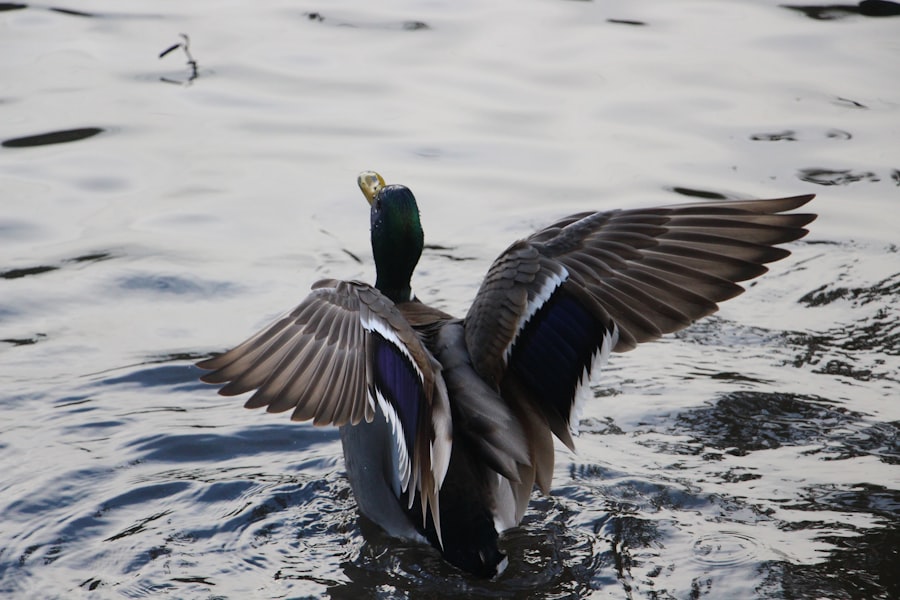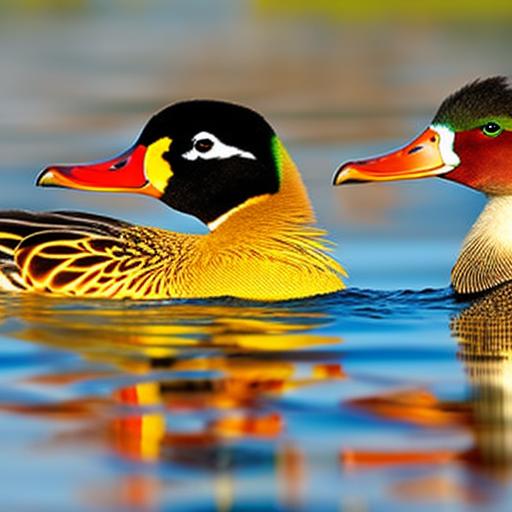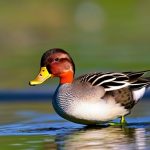Exotic duck breeds are a fascinating and increasingly popular choice for poultry enthusiasts. These breeds, which differ from the more common domestic duck breeds, offer unique characteristics and appearances that make them stand out. Exotic duck breeds are becoming more popular due to their beauty, rarity, and the desire for diversity in backyard flocks.
Key Takeaways
- Exotic duck breeds are unique and fascinating, with a variety of characteristics and origins.
- Some of the most popular exotic duck breeds include the Mandarin, the Cayuga, and the Indian Runner.
- Exotic duck breeds have a rich history and have been bred for various purposes, such as meat, eggs, and ornamental purposes.
- Raising exotic duck breeds can provide benefits such as pest control, entertainment, and a source of food.
- However, keeping exotic duck breeds as pets can also present challenges, such as finding appropriate housing and providing proper care.
The Most Popular Exotic Duck Breeds and Their Characteristics
There are several exotic duck breeds that have gained popularity among poultry enthusiasts. One of the most well-known is the Mandarin Duck, which is native to East Asia. With its vibrant plumage and striking appearance, the Mandarin Duck is a favorite among collectors and bird enthusiasts. Another popular exotic breed is the Indian Runner Duck, known for its upright stance and distinctive long, slender body. The Indian Runner Duck is highly regarded for its egg-laying abilities and is often kept for both ornamental and practical purposes.
The Cayuga Duck is another exotic breed that has gained popularity in recent years. This breed originated in North America and is known for its beautiful black plumage with an iridescent green sheen. The Cayuga Duck is not only visually stunning but also a good egg layer and a great addition to any backyard flock.
The History and Origins of Exotic Duck Breeds
Exotic duck breeds have a rich history that dates back centuries. Many of these breeds originated in different parts of the world and were brought to other regions through trade and exploration. For example, the Mandarin Duck was first introduced to Europe in the 18th century and quickly became popular among collectors for its striking appearance.
Exotic duck breeds differ from domestic duck breeds in their origins and characteristics. Domestic duck breeds have been selectively bred over generations for specific traits such as meat production or egg-laying abilities. In contrast, exotic duck breeds have maintained their unique characteristics through natural selection and adaptation to their native environments.
The Benefits of Raising Exotic Duck Breeds
There are several reasons why people choose to raise exotic duck breeds. One of the main benefits is their unique and beautiful appearance, which adds diversity and visual interest to a flock. Exotic duck breeds also offer practical benefits, such as their egg-laying abilities. Many exotic breeds are known for their high egg production, making them a valuable addition to a backyard flock.
In addition to their ornamental and practical benefits, exotic duck breeds can also be used for pest control. Ducks are natural foragers and can help control pests such as slugs, snails, and insects in the garden. Their constant grazing and rooting behavior can significantly reduce pest populations without the need for harmful chemicals.
The Challenges of Keeping Exotic Duck Breeds as Pets
While exotic duck breeds can be a rewarding addition to a backyard flock, they also come with their own set of challenges. One of the main challenges is finding suitable housing and space for these breeds. Some exotic breeds, such as the Indian Runner Duck, have an upright stance and require more space compared to other duck breeds.
Another challenge is providing proper care and nutrition for exotic duck breeds. These breeds may have specific dietary requirements that differ from domestic duck breeds. It is important to research and understand the specific needs of each breed to ensure they receive a balanced diet.
The Best Climate for Raising Exotic Duck Breeds

The ideal climate for raising exotic duck breeds depends on the specific breed and its native environment. Some exotic breeds, such as the Mandarin Duck, prefer cooler climates with access to water for swimming and foraging. On the other hand, breeds like the Indian Runner Duck can adapt well to a variety of climates.
Creating the ideal environment for exotic duck breeds involves providing adequate shelter, access to water, and appropriate temperature regulation. This can be achieved through proper housing, such as a well-ventilated coop or a pond with shade and shelter.
The Ideal Diet for Exotic Duck Breeds
Providing a balanced diet is crucial for the health and well-being of exotic duck breeds. These breeds may have specific dietary requirements that differ from domestic duck breeds. A diet rich in high-quality poultry feed, supplemented with fresh fruits, vegetables, and insects, can help meet their nutritional needs.
Clean water is also essential for exotic duck breeds. Ducks require access to fresh, clean water for drinking, bathing, and foraging. It is important to provide a constant supply of clean water to prevent dehydration and ensure their overall health.
The Health and Wellness of Exotic Duck Breeds
Like any other animal, exotic duck breeds are susceptible to certain health issues. Common health problems in ducks include respiratory infections, parasites, and nutritional deficiencies. Regular check-ups with a veterinarian experienced in avian care can help prevent and address these issues.
To keep exotic duck breeds healthy, it is important to provide them with a clean and sanitary environment. Regular cleaning of their housing and providing proper ventilation can help prevent the spread of diseases. Additionally, providing a balanced diet and access to clean water can contribute to their overall health and well-being.
The Breeding and Reproduction of Exotic Duck Breeds
Breeding exotic duck breeds requires careful planning and consideration. It is important to ensure that both the male and female ducks are healthy and of breeding age before attempting to breed them. Providing a suitable nesting area with proper bedding material can encourage breeding behavior.
Successful breeding also requires proper timing and monitoring of the ducks’ behavior. Ducks typically mate during the spring season, so it is important to observe their behavior and provide the necessary conditions for successful breeding.
The Future of Exotic Duck Breeds: Conservation and Preservation Efforts
Conservation and preservation efforts play a crucial role in ensuring the future of exotic duck breeds. Many of these breeds are rare and at risk of extinction due to habitat loss and crossbreeding with domestic duck breeds. It is important to preserve these unique breeds to maintain genetic diversity and prevent the loss of valuable traits.
Individuals can get involved in conservation efforts by supporting organizations that focus on the preservation of rare duck breeds. This can be done through donations, volunteering, or even participating in breeding programs. By actively participating in conservation efforts, individuals can contribute to the preservation of these beautiful and unique duck breeds.
Exotic duck breeds offer a unique and rewarding experience for poultry enthusiasts. Their beauty, rarity, and practical benefits make them a popular choice for backyard flocks. However, keeping exotic duck breeds as pets comes with its own set of challenges, including providing suitable housing, proper nutrition, and addressing specific health issues.
Creating the ideal environment for exotic duck breeds involves understanding their specific needs and adapting to their native environment. Providing a balanced diet, clean water, and regular veterinary care are essential for their health and well-being.
Conservation and preservation efforts are crucial for the future of exotic duck breeds. By supporting organizations that focus on preserving rare breeds, individuals can contribute to maintaining genetic diversity and preventing the loss of valuable traits. Whether raising exotic duck breeds or getting involved in conservation efforts, these unique birds offer a rewarding experience for poultry enthusiasts.
If you’re interested in exotic duck breeds, you might also want to check out this informative article on Poultry Wizard about the different types of chicken feed that geese can eat. It provides valuable insights into the nutritional needs of geese and how chicken feed can be a suitable option for them. To learn more, click here: Can Geese Eat Chicken Feed?
FAQs
What are exotic duck breeds?
Exotic duck breeds are domesticated ducks that are not commonly found in the United States. These breeds are often from other countries and have unique physical characteristics and behaviors.
What are some examples of exotic duck breeds?
Some examples of exotic duck breeds include the Indian Runner, Muscovy, Cayuga, Rouen, and Pekin. These breeds have distinct physical features and behaviors that set them apart from other domesticated ducks.
What makes exotic duck breeds different from other domesticated ducks?
Exotic duck breeds are different from other domesticated ducks in terms of their physical characteristics, behaviors, and origins. They often have unique feather patterns, body shapes, and behaviors that are not commonly seen in other domesticated ducks.
Are exotic duck breeds difficult to care for?
Exotic duck breeds are not necessarily more difficult to care for than other domesticated ducks. However, they may have specific dietary and environmental needs that require extra attention. It is important to research the specific needs of each breed before bringing them into your care.
Can exotic duck breeds be kept as pets?
Yes, exotic duck breeds can be kept as pets. However, it is important to note that some breeds may require more space, attention, and specialized care than others. It is important to research the specific needs of each breed before bringing them into your home as a pet.
Where can I find exotic duck breeds?
Exotic duck breeds can be found through breeders, hatcheries, and online marketplaces. It is important to research the reputation of the seller and the specific needs of the breed before making a purchase. Some breeds may also be available through local animal rescues or shelters.
Meet Walter, the feathered-friend fanatic of Florida! Nestled in the sunshine state, Walter struts through life with his feathered companions, clucking his way to happiness. With a coop that’s fancier than a five-star hotel, he’s the Don Juan of the chicken world. When he’s not teaching his hens to do the cha-cha, you’ll find him in a heated debate with his prized rooster, Sir Clucks-a-Lot. Walter’s poultry passion is no yolk; he’s the sunny-side-up guy you never knew you needed in your flock of friends!







